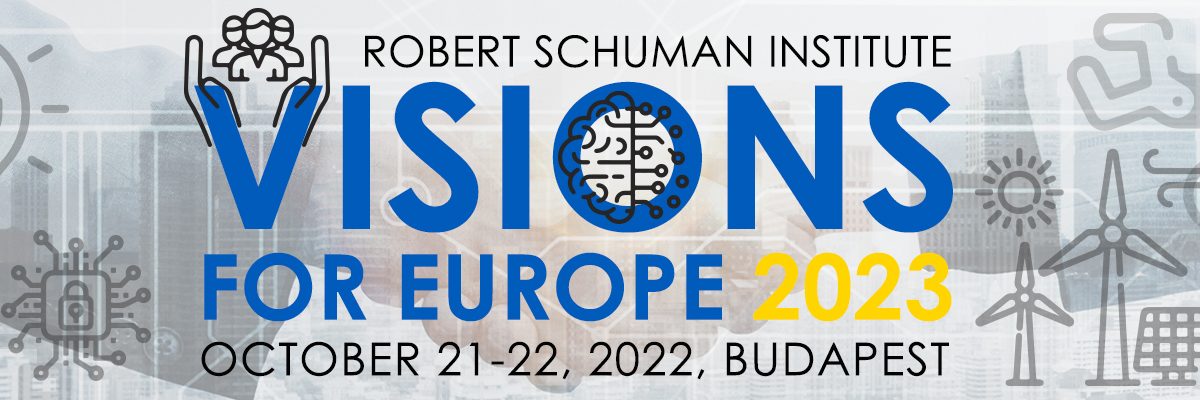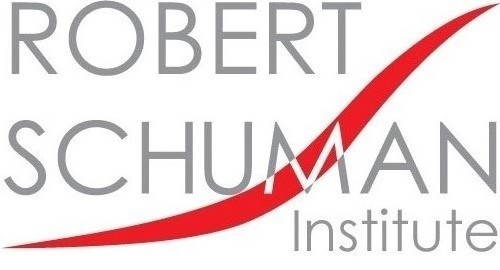VISIONS for EUROPE 2023

5th International Alumni Reunion Conference
Dear RSI Alumni,
We are very pleased to inform you that the Robert Schuman Institute for Developing Democracy in Central and Eastern Europe, in cooperation with its partners the Konrad Adenauer Stiftung Hungarian Office, the Robert Schuman Foundation Luxemburg, the Eduardo Frei Foundation, and the Hanns Seidel Stiftung Hungarian Office are organizing the 5th international alumni reunion conference involving former participants of our educational programs, speakers and trainers as well as representatives of our partners.
The event will bring together our accomplished and politically active alumni in professionally relevant discussions of current interest as well as to provide a framework for networking opportunity with fellow former participants and speakers of the RSI programs you attended.
WHERE:
The conference will take place in Budapest (venue: Batthyány Lajos Foundation, 1. Csónak Street, Budapest 1015, accommodation: Mercure Budapest Castle Hill Ibis, 41-43. Krisztina körút, Budapest 1013).
WHEN:
21-22 October, 2022 as follows:
21 October (Friday) – Arrivals in the morning, welcome coffee at registration, a plenary meeting and 3 parallel working groups in the afternoon
22 October (Saturday) – Working day with 3 parallel working groups and a closing plenary meeting
23 October (Sunday) – Departures
***
The discussions within the framework of the Conference will be centered around three main thematic clusters, introduced by prominent keynote speakers and featuring panel contributions by you, the participants. We put on the agenda key common challenges for our countries and our European community, and we are keen to gather and discuss your insights and near-term proposals.
- Rebuilding Ukraine
Almost eight months into the Russia-Ukraine war, the amount of destruction that has been inflicted on cities and infrastructure in Ukraine, and ensuing massive humanitarian crisis have been catastrophic not only for the region but also the rest the world, slashing global economic growth and directly challenging international security order. Unravelling the damage done and reconstructing Ukraine, however massive and difficult the enterprise will be, should be a major priority for the Ukraine’s friends and partners worldwide. The Ukrainian government pledged a strong commitment to „building a new country” aiming for modernization, implementation of European integration reforms in order to comply with the EU accession criteria, renewal of energy networks, green transition and digitalization, respect for the rule of law, strengthening of anti-corruption mechanisms and independence of judiciary, and transparency and accountability throughout the recovery process. Whether these will be successfully implemented will largely depend on dedicated, well-planned and coordinated effort of all actors involved, both within and outside Ukraine. Advanced planning and preparation now can save precious time later on, and a new Marshall Plan for the country will play a crucial role in sustaining public morale of Ukrainians, social cohesion and the will to resist. On the other hand Ukraine as a new candidate country for EU membership join the ranks of Western Balkan countries and presents its reconstruction plan in the framework of EU national development plans.
Points for discussion:
- Global impact of Russia-Ukraine war (social, political, economic, energy security challenges), status quo
- A new Marshall Plan? Ukraine Recovery Conference in Lugano –discussion points & outcome
- Ukraine as new EU membership candidate country: Reconstruction plan as a model for others?
- The impact on EU enlargement strategy overall
- Reform implementation strategies, main sectors, SWOT
- The role of civil society in rebuilding of Ukraine, international support for NGOs and CSOs
- Experience and expertise from the Western Balkans and the Middle East
- What can we do now?
***
- Digital transformation and the impact of artificial intelligence
The speed of technological transformation is skyrocketing, and there are plenty of both “dark” and “bright” sides to it. New technologies can help make our world fairer and more peaceful, boost connectivity and financial inclusion, access to trade and public services. Digital progress can support the achievement of each of the 17 Sustainable Development Goals, but it can as well threaten privacy and security, fuel social disruption, and have implications for human rights as well as tendencies of autocracy or democratic backsliding. Machines will continue to have an unprecedented impact on the workforce, generating much uncertainty with regard to the future of work and causing social, political and economic cleavages across the globe, leading first off to the transformation of the job market and explosion of inequality. The more technological solutions penetrate the global economy, the more jobs will disappear plunging societies into turmoil. There is an urgent need for local public measures to give each country a better chance of generating new employment opportunities, as well as supporting the adaptation of the education systems of European states to the digital age providing all groups of citizens with high quality, inclusive and accessible digital education and training, for the sake of creating a greener, more digital and resilient Europe. We have a long way to go with that.
Points for discussion:
- Benefits and disadvantages of AI and digitalization
- Impact of digital transformation on democracy, good governance, or autocracy
- Labor market and foreign direct investment impact
- Education and training system reforms
- The issue of inclusivity: making digital jobs and education accessible for all
- The state of digital infrastructure
- Cybersecurity challenges in digital transformation
***
- Energy security and green transition
Russia’s invasion of Ukraine made energy security a matter of the utmost importance. It is not only about the moral issue of preventing the aggressor from using the fossil fuel sales profits for sustaining the unprovoked war. Governments are trying to ease the burden of spiking energy prices on their citizens and industries, reduce carbon addiction and accelerate green transition. Many countries are revising their energy policies, especially those heavily dependent on Russian oil and gas. Secure and cheap renewable energy is vital for economic growth and prosperity; however, transition towards zero-carbon world is a long-term and costly enterprise, and comes with consequences for political, economic and technological security; chances are high hostile actors will continue to exploit this energy and geopolitical vulnerability. The EU cannot achieve its green transformation goals on its own, it requires the participation of its allies and trade partners worldwide. There will be some regions, industries and workers that will find it more difficult to follow this path alone. Therefore, a fair and inclusive approach to achieve a just transition towards a renewable energy will be absolutely crucial. Further fallout to discuss, will be mitigating the environmental impact of crisis-time or temporary energy policies, as well as the new context of sustainable development for livable urban spaces and a vital countryside.
Points for discussion:
- Russia-Ukraine war and its impact on global energy security and green transformation
- European Green Deal and REPowerEU –EU energy plans’ costs & consequences, reality check
- Implications of the green transition for the EU neighboring countries. What can the EU do to help facilitate the shift? How will it affect fuel supplies in the world, and in the neigbourhood?
- State / EU aid of strategic industries vs SME in crisis
- Sustainable development of cities and rural areas
- Mitigating environmental impact of crisis-time energy policies
- Good practice examples and inspiration from participants’ communities
***
The RSI is going to cover costs of full board and accommodation in double rooms at the venue. Because your participation is important to us, we could contribute to your international travel expenses from non-EU countries. That means we can cover a possible visa fee, and pay a flat rate of support irrespective of the way of actual transport (for more details please check the attached invitation letter or/and contact our team at the emails below).
Evgenia Jarabik (project manager):
evgenia.jarabik@schuman-institute.eu
Vladan Pavic (project coordinator):
vladan.pavic@schuman-institute.eu
Imre Rimóczi (project coordinator):
imre.rimoczi@schuman-institute.eu
***
Invitation letter_alumni conference
***
Please indicate your interest in participating under such conditions by filling in the application form, not later than 28 September 2022. Kindly note that filled application form does not guarantee you will be accepted for participation. Due to the limited number of places compared to our huge alumni community, we will give priority to those with a speaking contribution as well as those with a continued EPP member/applicant party affiliation.
We hope to meet you soon in Budapest!
